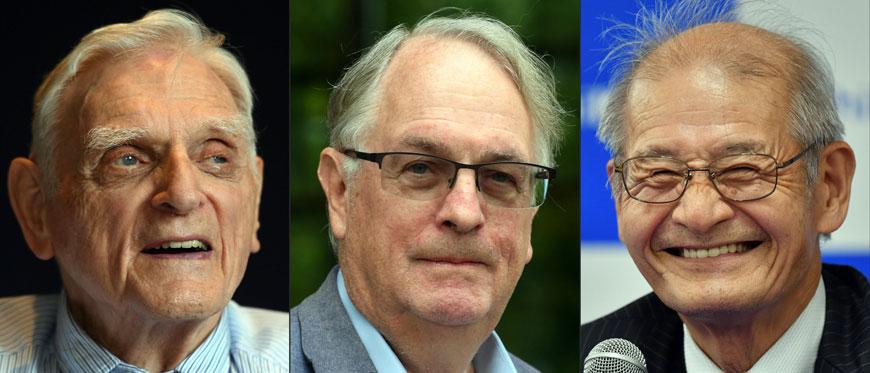You are here
Low-carbon LED lamp wins Nobel for Japanese-born trio
By AFP - Oct 07,2014 - Last updated at Oct 07,2014
STOCKHOLM — Three Japanese-born researchers on Tuesday won the Nobel Prize for Physics for inventing the LED lamp, a boon in the fight against global warming and aiding people in poverty.
The trio are Isamu Akasaki, Hiroshi Amano and Shuji Nakamura, who has since become a US national.
"This year's Nobel laureates are rewarded for having invented a new energy-efficient and environment-friendly light source — the blue light-emitting diode [LED]," the jury said.
"Their inventions were revolutionary," it said.
"Incandescent lightbulbs lit the 20th century. The 21st century will be lit by LED lamps."
To recreate the whitelight of the sun, red, green and blue need to be mixed.
Red and green diodes had been around for a long time, but devising a blue LED was the Holy Grail — and achieving it took three long decades.
The breakthrough came in the 1990s when the three researchers, after dogged work, coaxed bright blue beams from lab semiconductors.
"They succeeded where everyone else had failed," the jury declared.
"With the advent of LED lamps we now have more long-lasting and more efficient alternatives to older light sources."
LED lamps emit a bright white light, last for tens of thousands of hours and use just a fraction of energy compared with the incandescent lightbulb pioneered by Thomas Edison in the 19th century.
The most advanced LED lamps now consume nearly 20 times as little electricity as regular lightbulbs and their performance is improving constantly.
LEDs are also commonplace in computers, TV, watches and mobile phone screens.
Benefit for world
Around a quarter of world electricity consumption is used for lighting, so governments in many countries are promoting a switch to LEDs to slash heat-trapping emissions from fossil fuels, which are burned to generate power.
And because they have very low electricity needs, LED lights can be connected to cheap, local solar power — a benefit for the more than 1.5 billion people around the world who lack access to the electricity grid.
"I really think that Alfred Nobel would be happy with this prize... It's really something that will benefit most people," said Nobel committee member Per Delsing.
Unusually for a recipient of the Nobel Prize, Nakamura was employed at Nichia Chemicals, a small Japanese company, when carrying out the research that was rewarded on Tuesday in Stockholm.
"It's unbelievable!" Nakamura said when phoned by the Nobel Committee.
'Do whatever you like'
His co-laureate Isamu Akasaki told reporters at Meijo University in Nagoya that the announcement was "a half-surprise" and the "greatest honour".
"At first, it was said that this could not be invented during the 20th century. A lot of people left [the research project], but I never considered doing so at all," he said.
"I never thought of success or failure. I simply did what I wanted to do... Luckily, my colleagues supported me."
The octogenarian, born in 1929, had advice for young researchers: "Don't be fooled by fashionable subjects. Do whatever you like if it's really what you want to do."
The Nobel announcement was welcomed as "brilliant news" by the environmental group Greenpeace.
"It captures the spirit of the times," Sven Teske, a climate and energy campaigner, told AFP.
"It is high time that such innovative steps in the direction towards a sustainable future are celebrated and admired. Science and education are key to freeing us from fossil fuels."
Britain's Institute of Physics said the research "is having a direct impact on the grandest of scales, helping protect our environment, as well as turning up in our everyday electronic gadgets”.
Akasaki worked together with Amano at the University of Nagoya, when conducting their part of the path-breaking research.
He is currently a professor at Meijo University in Nagoya, while Amano, born in 1960, is a professor at Nagoya University.
Nakamura, born in 1954 in Japan, is now a US citizen and a professor at University of California, Santa Barbara.
The winners will share the sum of eight million Swedish kronor ($1.1 million, 883,000 euros) at an awards ceremony on December 10.
Last year's award went to Peter Higgs of Britain and Francois Englert of Belgium for the discovery of the Higgs boson, which gives mass to other elementary particles.
Related Articles
Two Americans and a German scientist won the Nobel Prize in chemistry on Wednesday for finding ways to make microscopes more powerful than previously thought possible, allowing scientists to see how diseases develop inside the tiniest cells.
STOCKHOLM — Three researchers won the Nobel Chemistry Prize on Wednesday for the development of lithium-ion batteries, paving the way for sm
OSLO/STOCKHOLM — The announcement of the Nobel Medicine Prize on Monday opens an unusual 2019 Nobel season in which two literature laureates















